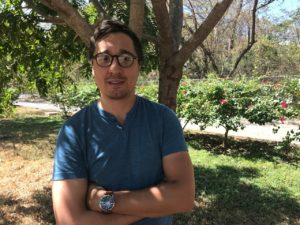EARTH alum on frontline of water crisis
Christian Golcher (’08, Costa Rica) named to 100 Water Heroes list

Christian Golcher (’08, Costa Rica) named to 100 Water Heroes list
Since arriving at EARTH University in 2005, Christian Golcher has developed his career around a critical shared resource – water. That career has earned him a spot on the list of 100 Water Heroes.
An initiative of the nonprofit Thirst, the list seeks to celebrate the work of global water champions – folks taking meaningful steps toward water’s protection worldwide.
Now a researcher at the National University of Costa Rica, Christian’s work deals with the toll that human activity exacts on the ecological well-being of rivers. He analyzes diverse social problems and holds impact-reduction trainings for communities.
The formative years
During his four years as an EARTH student, Christian developed a deep passion for community work. Upon graduating in 2008, he completed a master’s degree at San Carlos University of Guatemala – focusing on reducing environmental vulnerability and degradation, all to fortify emergency response and territory management.
“Agriculture and hydrologic resources are intimately connected. I began to study agriculture to work on issues of environmental sustainability,” Christian says. “In the fight against the water crisis, we need the participation of everyone – especially those who are sensitized to agricultural and hydrological sustainability.
The EARTH grad has been supporting Costa Rican watersheds in his personal and professional life for more than 10 years already, in both the Caribbean and Pacific regions.
River basin projects
Christian spent two years at the Reventazón River Basin, while pursuing his master’s. He worked alongside Cartago municipal representatives, community leaders, educators, retirees and local farmers to develop tactics to bolster the area’s environmental management.
One of his many projects brought him together with 50 volunteers – among them members of the EARTH community – to plant 1,000 native trees and install a biodigester. Additionally, he oversaw a risk-management campaign in Tejar del Guarco – an area prone to severe flooding due to its volcanic eruption-damaged soils.
Christian firmly believes that his duty is to contribute to the initiatives that communities are already undertaking, to promote participatory models that foster empowerment in rural areas and boost their capabilities.
“One must emphasize the value of community-born initiatives,” Christian says. “Sometimes, communities don’t realize just how valuable their initiatives are.”
Christian is committed to providing information critical to decision making throughout the region. He believes that facilitating access to the scientific point of view and its important data can generate real change.
In his view, Costa Rica faces great difficulty in territory management, especially with respect to watersheds. To combat this, he worked with the Hydrologic Resource Center for Central America and the Caribbean on water quality monitoring of the Liberia River. Seven sampling points were established, each testing a different spot along the river’s path through the city of Liberia. Christian and his team sought to learn the physiochemical impact that 50,000 urbanites have on the river.
In 2013, he reached out to EARTH to recruit the University’s third-year students to the project.
Passion for water
In 2016, Christian’s passion led him to develop the hydrologic engineering major at the National University of Costa Rica. He currently teaches a course about ecology and wetland management to fourth-year students.
“Students are very motivated to participate in a process that’s so socially, environmentally and scientifically relevant,” Christian says. “For me, it’s very motivating to be able to contribute to their education.”
This agent of change truly is a water hero. Seeking to improve the lives of millions through his work, he embodies the core mission of his alma mater.
“Water is a sensitive element in the development of our communities,” Christian says. “We still have so much to do.”




